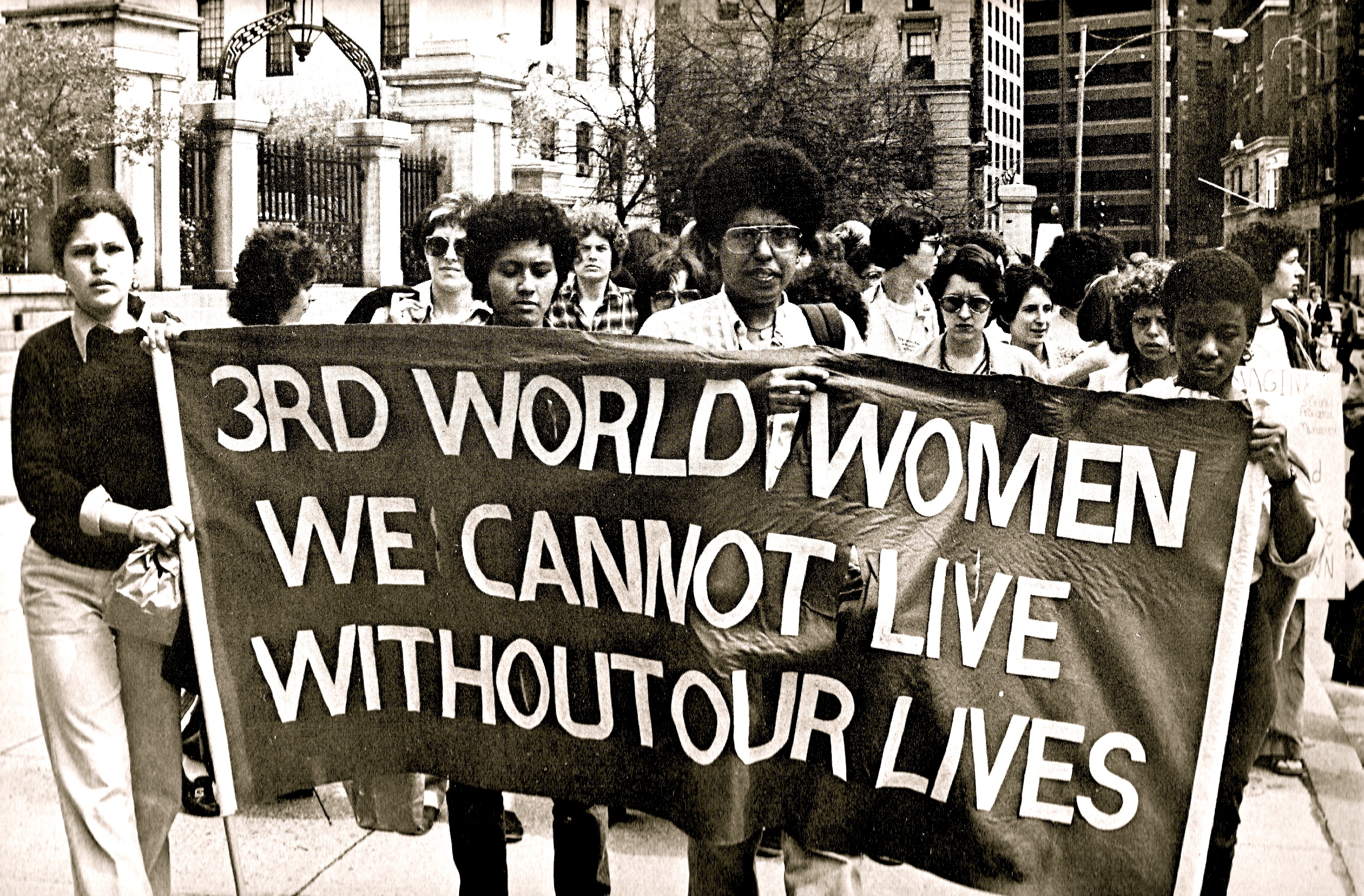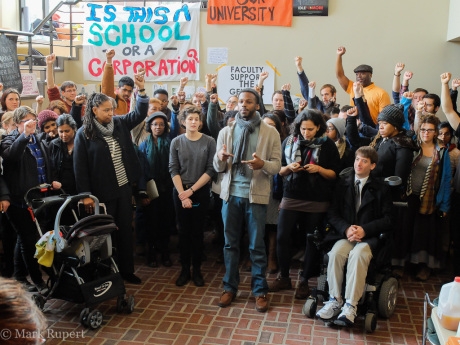
“Greetings! Much appreciation goes to everyone who made “Teach In to Act Out” possible, especially Mary Rose Go, who held my hand to get me here.
And thanks to all the comrades in the struggle who are here; I am honored to be among you!
I want to remember and honor two who left us recently. One most of you know or have heard of is Leslie Feinberg, the transgender warrior who made us understand, among other things, the inextricable links between gender classifications and identities and global capitalist processes, and the deeply loved spouse of our sister friend Minnie Bruce Pratt.
The other feminist most of you will not know or even have heard of is Maha Abu-Dayyeh, the Palestinian activist and director of the Women’s Centre for Legal Aid and Counseling (WCLAC), one of the most influential leaders of the modern Palestinian women’s movement, and one of my dearest friends and teachers. It was through her and our work together at WCLAC that I developed many of the ideas I will be sharing with you today.
As I was thinking about what to say today, Dickens’s lines from The Tale of Two Cities came to mind:
“It was the best of times, it was the worst of times;
it was the age of wisdom, it was the age of foolishness;
it was the epoch of belief, it was the winter of despair.”
We have ample evidence of all these polarities: The 1% of the world owns nearly half the world’s wealth, and 80% of the world’s peoples are living on less than $10 a day. There are advances in medicine and technology; there’s creativity and beauty in the arts and music and performance and wars, massacres, and horrific violence of all forms, as we have been witnessing.
We also see possibilities, as many people, from various walks of life, organize for justice, equity, and a truly secure and sustainable world. This weekend’s gathering is a very good example of that. As is the nationwide organizing around policy brutality; worldwide organizing against violence against women; the BDS movement to help end Israeli occupation of Palestine; the years-long fight against the installation of new US military bases in Okinawa and Korea; and the struggle for the rights of domestic workers in New York and LA, to name a few. At the same time, the future looks unrelentingly bleak.

This country, the US, one of the richest and the most militarily powerful, is in deep trouble and is the source of deeper troubles worldwide. All of us in this room know the signs. One of the most destructive, I believe, is fear combined with hyper-individualism, so embedded in this society. Many, even some of the most conscious and privileged folks among us, are afraid and motivated by fear. This has led to accepting the prevailing message that aggression leads to peace and that closing borders provides security. A kind of collective and individual self-absorption has gripped this nation.
Audre Lorde said, “we have been socialized to respect fear more than our own needs for language and definition, and while we wait in silence for that final luxury of fearlessness, the weight of that silence will choke us.”
Cornel West says, “We’ve forgotten that a rich life consists fundamentally of serving others, trying to leave the world a little better than we found it.”
But it’s not easy. Leaving the world a better place demands courage. West says, “In many instances, we will be stepping out on nothing, and just hoping to land on something. But that’s the struggle. To live is to wrestle with despair, yet never allow despair to have the last word.”
I am firmly convinced that we—those who care, those who struggle for a just peace—should give the last word to LOVE, understanding that its most generative expression is the struggle for justice. As Dr. Martin Luther King Jr. has told us, justice is what love looks like in practice. As activists struggling for social and ecological justice, we must love as we DO: love the work, love the ideas and values that frame the work, and above all love the people we work with and humanity itself.
To do so, we must ourselves develop our own humanity because, in one way or another, we are indigenes of the neo-liberal, neo-colonial project that reproduces and adapts itself to try to ensure we will always be looking in the wrong direction—anti-racist, anti-capitalist, anti this and that—rather than imagining a truly radical alternative.
In mainstream US culture, we are expected to grow by separating and individuating ourselves from others; that is how we are supposed to become mature. Along the way, we proclaim our uniqueness, difference, and exceptionality. And we are rewarded. By standing out, people may see us as leaders, as more intelligent and competent than others and so on. It’s an extension of the pervasive American exceptionalism. Many of us believe, deep inside, that we can do things better singularly than collectively, even as we gather in groups like this. When push comes to shove, we still place a lot of faith in individual charismatic leaders. In a sense, identity politics may be a collective example of this growth through separation and individuation as well.
As a kind of corrective, feminist psychologist Jean Baker Miller and her colleagues developed a theory of human development suggesting that, in fact, growth and development happen through relational connection with and to others. They call this growth-in-connection.
Growing in this way as adults requires different kinds of engagements in groups—whether we are talking about activist spaces, organizations, or universities. It means, using Joyce Fletcher’s term, a relational practice that centers caring, being involved in the nitty-gritties of organizing, seeking consensus, paying attention to others’ emotional needs and states, and addressing the contradiction that results from the structural inequalities (and hierarchies whether we acknowledge it or not) embedded in most kinds of group engagements. This kind of relational growth helps us to love deeper, more fully, and in Thich Nhat Hanh’s words, with great equanimity.
These ideas about growth answer a question that often emerges in conversations about how change happens: what has to happen first, individual change or change outside of individuals. “We have to change first before we can do the work.” This is what I have most often heard. But they are inextricably linked.
We must go even further because love and loving are not simply an individual act or stance. I want us to create Beloved Communities as we engage in the struggles. Because, as Dr. King said,“the end [of struggle] is reconciliation; the end is redemption; the end is the creation of the beloved community. It is this type of spirit and this type of love that can transform opposers into friends. It is this type of understanding-goodwill that will transform the deep gloom of the old age into the exuberant gladness of the new age. It is this love which will bring about miracles in [our] hearts.”
We can do this. As the late poet June Jordan wrote in her poem for South African women struggling against the apartheid regime, “We are the ones we have been waiting for!”
The following quotes were added after the conference. One was inspired by Minnie Bruce Pratt, my teacher and friend, and the other was posted on my Facebook homepage:
At the risk of seeming ridiculous, let me say that the true revolutionary is guided by a great feeling of love. It is impossible to think of a genuine revolutionary lacking this quality. Perhaps it is one of the great dramas of the leader that he or she must combine a passionate spirit with a cold intelligence and make painful decisions without flinching. Our vanguard revolutionaries must idealize this love of the people, of the most sacred causes, and make it one and indivisible. They cannot descend, with small doses of daily affection, to the level where ordinary people put their love into practice…[O]ne must have a great deal of humanity and a strong sense of justice and truth in order not to fall into extreme dogmatism and cold scholasticism, into isolation from the masses. We must strive every day so that this love of living humanity will be transformed into actual deeds, into acts that serve as examples, as a moving force. –Che Guevara
—
To be hopeful in bad times is not just foolishly romantic. It is based on the fact that human history is a history not only of cruelty, but also of compassion, sacrifice, courage, kindness.
What we choose to emphasize in this complex history will determine our lives. If we see only the worst, it destroys our capacity to do something. If we remember those times and places—and there are so many—where people have behaved magnificently, this gives us the energy to act, and at least the possibility of sending this spinning top of a world in a different direction.
And if we do act, in however small a way, we don’t have to wait for some grand utopian future. The future is an infinite succession of presents, and to live now as we think human beings should live, in defiance of all that is bad around us, is itself a marvelous victory. –Howard Zinn





